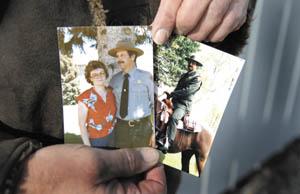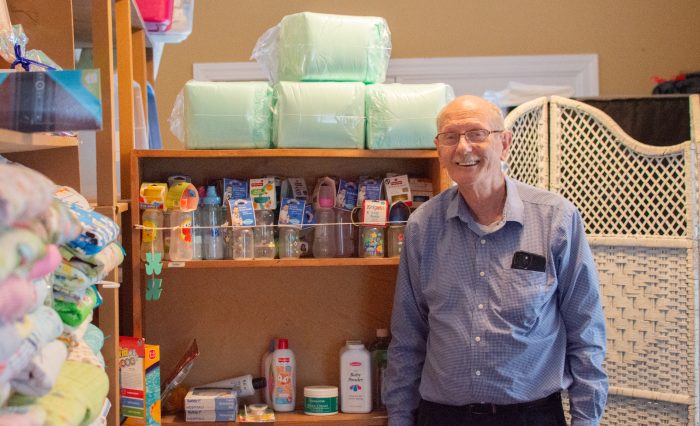Now retired, Lee Davis had a whirlwind career
Published 12:00 am Monday, December 10, 2007

- Photo by Hunter Wilson/Daily NewsLee Davis holds pictures of himself and his wife, Mary Ann, that were taken in 1986 when he worked at Yellowstone National Park. He worked there for eight years.
CAVE CITY — When Lee Davis lost his mother to leukemia when he was 14, he took his little brother Greg, who was seven years his junior, under his wing, teaching him to ride horses during the long hours when he was responsible for him.
“When I was 8 years old, while Lee was large for his age, I was the opposite,” Greg Davis said. “I was the little runt for my age, (but) when I was 8 years old, I could go out and catch my own horse and put a bridle on it and ride anywhere I wanted to go.”
Trending
Lee Davis became his little brother’s hero.
“He could play basketball,” Greg Davis said. “I thought he was the biggest, greatest guy there was.”
When Lee Davis got his first job at Mammoth Cave National Park, Greg Davis thought he’d do that someday, too.
“That was my big influence and it was just assumed that when I got out of high school, I would go into that kind of work,” Greg Davis said.
Greg Davis, who is now manager of the Mammoth Cave Hotel, still looks up to his brother.
Lee Davis said last week, as he walked into the barn at his home outside Cave City, that few know him as well as his brother does.
Trending
Then, he ambled down the gravel lane leading to his barn office, wearing a pair of boots, a cowboy hat and a heavy suede coat.
“This is the Happy Trails Saloon and Office,” he said. “Guys like to come in here and sit around and have a beer.”
The office was filled with mementos from his days working in concessions for the National Parks Service.
It was a career he unknowingly began preparing for after graduating from Munfordville High School in 1961.
That summer, Lee Davis became a busboy at the Mammoth Cave Hotel.
“Then I did a number of jobs” at the park, he said. “The fourth summer I was there, I ran the new service center for them and entered a management training program,” which was set up at Big Bend National Park in Texas to train people to run hotels.
He’d taken time off from attending Campbellsville College to attend the management training program and found that the break paid off.
It was around the same time he married Mary Ann Watson, a college girl he’d met while both did summer work at Mammoth Cave.
“The next summer, they sent me to Olympic (National Park in Washington) to run Hurricane Ridge Lodge,” Lee Davis said. “It was an adventure for a country boy” who had just graduated with a degree in elementary education from Campbellsville.
Lee Davis, who by then had a daughter, Sarah, best loved how the melting snow from the mountains trickled down to help create wonderful sweeps of wildflower color.
“You still had patches of snow, but a profusion of wildflowers” existed as well, he said. And “as you looked out the back of that lodge, you could see snow-capped mountains at 180-degrees, and you could see river valleys. It was just a breathtaking view.”
But Lee Davis wouldn’t stay at Olympic.
When he got a job as assistant manager of operations of concessions at Mammoth Cave National Park, he took the job at 24 years old.
A year later, he went to Big Bend as manager of operations of concessions.
After a “successful run” of about two years there, and the birth of a second daughter, Susan, Lee Davis returned to Mammoth Cave to be manager of operations of concessions, he said.
He was thrilled to be back in the area because “my family’s from here and you always want to come back home,” he said.
When Lee Davis successfully ran the Mammoth Cave concessions for more than six years, the National Park Service took notice.
Concessions at other parks were having problems at the time, Lee Davis said, and the National Park Service hired him to run concessions at Zion National Park, where the colorful sandstone walls in Utah took his breath away.
Lee Davis, who by then had a son, Barry, loved his surroundings in those days.
“Zion was a favorite because every day I thought, walking to work, ‘this is beautiful place,’ ” he said.
Lee Davis also worked at Bryce Canyon National Park in Utah at the time and also loved the surroundings there.
But when he was offered a job as chief of operations for concessions of the Midwest region that encompassed 10 states, Lee Davis took the job.
While he enjoyed traveling throughout the states at first, and being based in Omaha, it wasn’t the life he wanted.
“The problem was I had to travel about 20 weeks a year,” he said. “I got real tired of that after four years, and I never got to be comfortable in a city.”
When the chance to move to Yellowstone as head of concessions there came up, Lee Davis was ready to go.
“Yellowstone was a place that I felt fortunate to be able to go to work,” he said.
He loved the remoteness of the park, where bears were in abundance and he was able to take extensive trips into the back country with pack mules and horses for days at a time.
Even the treacherous winters that kept people indoors often did not bother Lee Davis much.
“A lot of people had parties and get-togethers,” he said. “And we had a little library and the kids were involved in school.”
Lee Davis especially liked watching his daughters play basketball and his son, who went on to be a semi-professional snowboarder, learn to ski.
And the back country trips, which at times found him leading pack mules while on a horse walking on a three-foot-wide trail over a 4,000-foot ravine, were a favorite activity.
Lee Davis liked “the adventure” of the back country trips, he said.
He also “liked riding horses and the expectation of what you would see and being in the places that each year only a handful of people got to see.”
But in 1990, Lee Davis decided it was time to take a job as chief of concessions management for the National Park Service in Washington, D.C.
“I thought my son was growing up in an unreal world,” where it was rural in Yellowstone and skiing was a class in school, he said. “And he needed to see how other people lived.”
Also, Lee Davis wanted the job in Washington because “I like pressure situations,” he said, “and I thought I did my best work under pressure; and that was all a person could deal with, all the pressures there. In addition to putting in eight- to 10-hours in the office, I had bumper-to-bumper traffic and it took an hour to get home” to Silver Springs, Md.
While there were other pressures in Washington, including the suggestion that he eliminate his Southern accent with help from a speech therapist so he could get ahead in his career, there were also interesting times, Lee Davis said.
He’ll never forget how upset some animal rights groups got, he said, when the National Park Service wanted to remove a large group of wild cats that were eating migrating songbirds in a local park.
“I’d never talked to a group of ladies before who had such hatred for me in their eyes,” he said.
Lee Davis remembers the relief he felt when the cats were successfully adopted – by a member of one of the groups opposed to the cats’ removal – and moved out of the park.
He also remembers the sense of freedom he got when he decided to begin tapering off his National Park Service career by taking a job at Big South Fork National River and Recreation area in Tennessee.
With the job, there was no one-hour, one-way commute that felt like five hours, Lee Davis said, and he was once again surrounded by nature.
Also, “the people reminded me of the folks in this area,” Lee Davis said.
But after awhile, he took a job in the regional National Park Service office in Atlanta, before moving back to southcentral Kentucky to wrap up his career at Mammoth Cave.
At Mammoth Cave, there were no worries about eliminating his Southern accent, and he could raise Tennessee Walking horses at his home, Pleasant Hill, which is one of three farms he now owns.
Now, Lee Davis, who is retired from the National Park Service, is enjoying life in Pleasant Hill with his family, including grandchildren.
He often travels with his wife to beading conventions and trail riding events.
“I feel certain I’ve seen more beads that any other man in Barren or Warren counties,” he said deadpan. “But I’m a good boy and carry bags of beads during the week so I can go” to cowboy gathering events.
At one cowboy gathering in Arizona, he bought a Riders in the Sky CD that’s in his truck and bears the title, “A Great Big Western Howdy,” which seems to suit Lee Davis perfectly.






